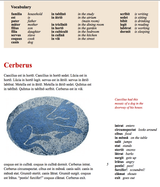>>24659244
>if I don't like the book that's an opinion I'm entitled to
But that's not what you said. You didn't merely come on here to say that "you didn't like it." You came on here (a public forum) and called it a "sham" and argued that it's ridiculous to expect anyone to be able to learn from it. You're entitled to your opinions, but you're not entitled to spread harmful ideas on a public forum without challenge.
>The difference between Wheelock's and LLPSI when it comes to companion books is that only one of these makes the very bold claim that you don't need anything beyond the Latin text and some supposed magical power called "induction".
Who said that? Do you have a quote so we can see exactly what they said?
Part of the reason I misread the blurb about Grammatica Latina is that the main text, Familia Romana, also contains grammatical tables (collecting the tables taught throughout the book in one place) in the back of the book. I'm looking at a copy of Grammatica Latina, and that's basically what it is. Primarily a collection of grammatical tables. That's hardly a necessary supplement, and it's existence doesn't support your point, because, like Conspectus Grammaticus, it doesn't appear to contain anything that isn't present in the main text Familia Romana, other than maybe the index of verbs at the end. In short, these books aren't filling up what is lacking in Familia Romana. They're just trying to reorganize the grammatical lessons from Familia Romana into a study guide (CL) or reference format (GL).
The existence of necessary companions is also irrelevant. The point of the "nature method" and "inductive learning" is that you learn things in context. You learn the nominative-accusative distinction by seeing one person (the subject) do something to another person (the object) and note that it entails a change of the word's ending. You learn the word "videt" from context and from the fact that it is immediately preceded by a picture of the subject turning to look at the object (see >>24658729). That doesn't meant that supplemental materials can't have a place. If the student is learning on his own, he might want the comfort of a study guide (Latine Disco or Neumann Companion) to fill up the place of a teacher that would review the material in class. If the student wants to do more exercises along the lines of the "pensa" questions in the end of the book, there is a workbook he can buy. The answer key is sold separately from the main text. This is standard for any textbook series.
